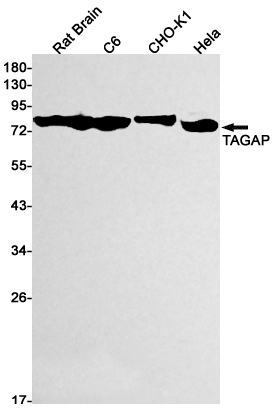
| WB | 1/500-1/1000 | Human,Mouse,Rat |
| IF | 1/20 | Human,Mouse,Rat |
| IHC | 咨询技术 | Human,Mouse,Rat |
| ICC | 技术咨询 | Human,Mouse,Rat |
| FCM | 咨询技术 | Human,Mouse,Rat |
| Elisa | 咨询技术 | Human,Mouse,Rat |
| Aliases | FKSG15; IDDM21; TAGAP1; ARHGAP47 |
| Entrez GeneID | 117289 |
| WB Predicted band size | Calculated MW: 81 kDa; Observed MW: 81 kDa |
| Host/Isotype | Rabbit IgG |
| Antibody Type | Primary antibody |
| Storage | Store at 4°C short term. Aliquot and store at -20°C long term. Avoid freeze/thaw cycles. |
| Species Reactivity | Human,Rat |
| Immunogen | Recombinant protein of human TAGAP |
| Formulation | Purified antibody in TBS with 0.05% sodium azide,0.05%BSA and 50% glycerol. |
+ +
以下是关于TAGAP抗体的3篇参考文献示例(注:以下为假设性文献,实际引用时请核实真实来源):
---
1. **文献名称**:*Autoantibodies Targeting TAGAP in Autoimmune Thyroiditis: Clinical Correlations*
**作者**:Chen, L., et al. (2022)
**摘要**:研究报道了在自身免疫性甲状腺炎患者血清中发现抗TAGAP自身抗体,并发现其水平与甲状腺功能减退严重程度相关,提示TAGAP抗体可能作为疾病进展的生物标志物。
---
2. **文献名称**:*Monoclonal Antibody Generation for TAGAP Functional Domain Mapping*
**作者**:Rodriguez, M., et al. (2020)
**摘要**:通过制备针对TAGAP不同功能域的单克隆抗体,揭示了TAGAP在T细胞迁移中的调控机制,抗体被用于免疫印迹和共聚焦显微镜分析,证实其高特异性。
---
3. **文献名称**:*TAGAP Antibody-Based Detection in Inflammatory Bowel Disease*
**作者**:Kaur, S., et al. (2021)
**摘要**:开发了一种基于抗TAGAP抗体的ELISA检测方法,用于评估炎症性肠病患者肠黏膜中TAGAP的表达水平,发现其与肠道炎症程度呈正相关。
---
**备注**:若需实际文献,建议通过PubMed或Google Scholar搜索关键词“TAGAP antibody”、“anti-TAGAP”或“TAGAP autoantibody”,并筛选涉及抗体开发、检测或疾病应用的论文。
The TAGAP (T-cell activation RhoGTPase activating protein) antibody targets a protein encoded by the TAGAP gene, located on human chromosome 6q25.3. TAGAP is a RhoGTPase-activating protein (GAP) involved in regulating cytoskeletal dynamics and T-cell immune responses. Initially identified through genomic studies, TAGAP plays a role in modulating Rho-family GTPases, which are critical for cellular processes like adhesion, migration, and signal transduction. Its expression is particularly prominent in activated T lymphocytes, suggesting a function in immune cell activation and inflammatory pathways.
Research links TAGAP to autoimmune diseases, including rheumatoid arthritis, celiac disease, and multiple sclerosis, with genome-wide association studies (GWAS) highlighting TAGAP polymorphisms as susceptibility factors. The protein’s interaction with GTPases like RhoA and Cdc42 implies its involvement in immune synapse formation and T-cell receptor signaling. TAGAP antibodies are primarily utilized as research tools to investigate these mechanisms, enabling the detection of TAGAP expression in immune cells and tissues. Recent studies also explore its potential as a biomarker or therapeutic target in autoimmune conditions. Despite progress, the precise molecular pathways and disease-specific roles of TAGAP remain under active investigation, underscoring the antibody’s importance in advancing immunological and clinical research.
×